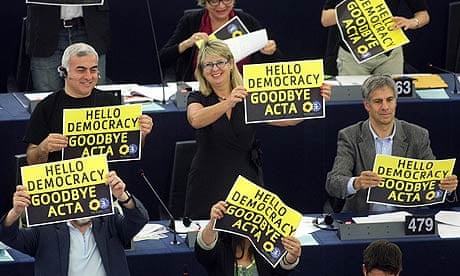The European Parliament has overwhelmingly defeated the international Acta anti-piracy agreement, delighting its opponents and plunging its supporters into gloom.
The vote is the first time that the parliament has used its powers under the Lisbon Treaty to reject an international trade agreement.
However, other countries such as the US and Japan are expected to continue with implementing it.
Acta could still be revived if the European Commission, the executive arm of the EU, considers that it needs to be implemented and wins a court decision over it.
The parliamentary vote on approving the bill on Wednesday saw 478 against and 39 in favour, with 165 abstentions.
The defeat brings to an end years of secret international negotiations, during which opponents of the treaty had complained that it was not being given sufficient public examination to determine whether its proposals were excessive or reasonable.
When it finally surfaced and became the topic of European Parliament discussion, opponents complained that it could, if interpreted strictly, lead to censorship and loss of privacy online.
Fears that the treaty would limit internet freedom had mobilised broad opposition across Europe, leading to demonstrations in a number of cities in the spring.
Wednesday's decision means that as far as the EU is concerned, the treaty is dead – at least for the moment – though other countries may participate.
A spokesman for the European Commission said it might try again after it obtained a court ruling on whether the agreement violated fundamental EU rights. If it did not, the EC might revive it – a move that the treaty's supporters called for after the vote.
Frances Moore – chief executive of the International Federation of the Phonographic Industry, representing record labels – urged the European Parliament to make effective intellectual property rights enforcement a top priority in its external trade policy.
Supporters said Acta, which stands for Anti-Counterfeiting Trade Agreement, was needed to standardise international laws that protect intellectual property rights.
"Acta is an important tool for promoting European jobs and intellectual property," said Anne Bergman-Tahon, director of the Federation of European Publishers, a member of a coalition of more than 130 organisations supporting Acta.
"Unfortunately, the treaty got off on the wrong foot in the parliament, and the real and significant merits of the treaty did not prevail."
Opponents of Acta were jubilant. David Martin, Socialists and Democrats Euro MP and author of the parliamentary report on the treaty, said after the vote: "ACTA is now dead in the EU thanks to the European Parliament.
"I am very pleased that the parliament has followed my recommendation and rejected Acta. The treaty is too vague and is open to misinterpretation. I will always support civil liberties over intellectual property rights protection in the EU."
Jim Killock, executive director of the UK's Open Rights Group (ORG)said: "This is a tremendous victory for the movement, for democracy and for every European citizen that has demanded that their rights be respected. Acta must be abandoned. The commission must drop its calls to try again.
"ORG would like to thank the thousands of activists from the UK that helped persuade MPs to stand up for democracy."
Supporters of Acta noted that its international status meant some countries would implement it anyway.
"[That] is a significant loss for the 27 EU member states," said Alan Drewsen, executive director of the International Trademark Association.
Socialists and Democrats president Hannes Swoboda said in a statement: "The commission and the council will now be aware that they cannot overrun the Parliament, which represents and defends citizens.
"But now it is time to look forward and tell the commission that we are willing to work hand in hand on fighting counterfeiting and protecting copyright with full respect to fundamental freedoms. This time we will do it in the light of public opinion and involve a wide range of citizens and stakeholders from the start."
But Dominick Luquer, secretary-general of the International Federation of Actors, said: "The debate around Acta has unfortunately been framed in terms of censorship and 'breaking of the internet' rather than about protecting the economic basis for jobs in Europe."
Organisations supporting Acta said that it had the backing of organisations which employed more than 120 million workers in Europe.
